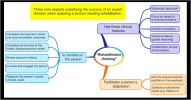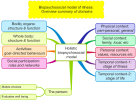Andy
Senior Member (Voting rights)
Abstract
Objective
To propose three areas of cognitive expertise as the foundation of rehabilitation, uniting the many varieties of rehabilitation.Five issues
The following matters require an explanation:(i) Does only providing assistive technology constitute rehabilitation?
(ii) What explains the dramatic success of spinal cord injury rehabilitation?
(iii) How did stroke rehabilitation units reduce mortality and morbidity?
(iv) How does rehabilitation improve outcomes in progressive conditions?
(v) How does rehabilitation benefit people born with a disabling condition?
Foundations
People naturally adapt to illness, and rehabilitation facilitates this adaptation within the holistic biopsychosocial framework.Three features
Three cognitive characteristics of rehabilitation practice are identified:(i) Recognising that the person's adaptation to any limitations imposed by a health condition is the fundamental process underlying change, and that rehabilitation expertise enhances and facilitates it.
(ii) Being person-centred, considering the patient's situation using the holistic biopsychosocial model of illness, paying particular attention to the potential long-term social outcomes, including living arrangements.
(iii) Using systematic and evidence-based clinical reasoning to achieve a holistic formulation focused on functional problems, collaborating with other professions and services in the interventions.
Healthcare
Rehabilitation is one of many specialities using a biopsychosocial healthcare approach, focused on these principles, which contrasts with a biomedical approach focused on disease.Conclusion
Rehabilitation expertise has a broader scope than biomedical practice, emerging from rehabilitation thinking, which combines three key features: enhancing the person's adaptation, being person-centred, and employing a systematic approach to clinical reasoning. These differences resolve the five issues.Open access



